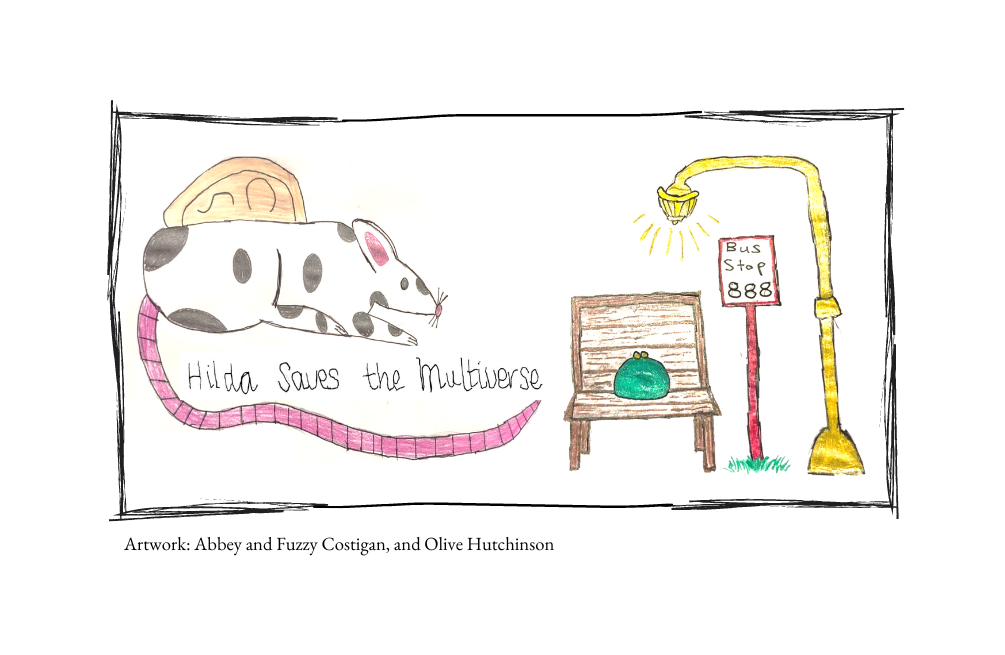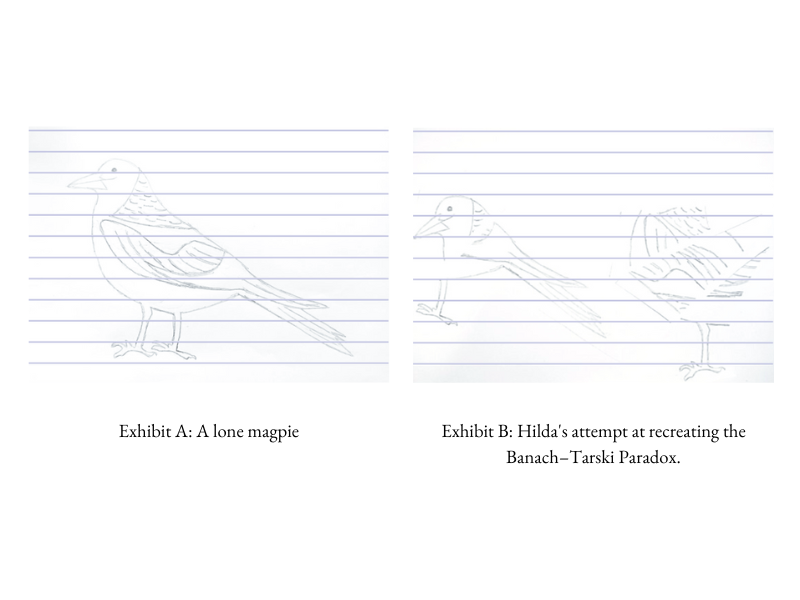Hot Desk Extract: Hilda Saves the Multiverse
As part of the Wheeler Centre’s Hot Desk Fellowship programme, Theresa Tully worked on Hilda Saves the Multiverse, a middle-grade fantasy/sci-fi about Hilda, a young physicist who sets out across the multiverse to save a city drowning in mushroom soup.

This excerpt is taken from early in the novel and explores Hilda in the ordinary world, right before she embarks on her adventure.
The rain continued into Saturday.
Outside 108 Glencoe Drive, a waterlogged magpie perched on the limb of a gumtree, carolling in joy at all the worms it soon would feast upon. Inside, Hilda, in her singlet and silken boxers, practised her southpaw stance from the second-storey window, as she eyed off the bird and reflected on the Banach–Tarski paradox, curious as to whether it would work on non-spherical shapes. That was to say:
With a few precise incisions, could a lone magpie be turned into two?

Hilda pondered such conundrums often. A budding pugilist and physicist, she didn’t have time to play with puppies or pet rocks. Not when paradoxes and contradictory statements on the universe were yet to be proven. Not that they could be proven, paradoxically speaking… Resolved was a more accurate statement. Until that time, time was finite for the girl of ten.
The magpie preened its feathers. Hilda reconsidered her points of incision, her chin a scalpel slicing through the air. “How many cuts?” she whispered, then felt strange for saying it. She wasn’t a killer. This was science. No different than a mouse shouldering a human ear, apart from the glaringly obvious fact that the magpie would be dead and the mouse would be alive – burdened no less, but alive – and with possibly more advanced hearing.
“Hmm,” hummed Hilda. And the thought of murder and mice with ultrasonic hearing evaporated, like the falling rain outside.
The last bit of sun poked through the gloom. The magpie glided from the gumtree to the grass, ready to mine its evening meal.
Hilda rose on her toes, gave a quick one-two, then scooped up her notebook and pencil from the windowsill.
She had to look twice.
Across the street, on a patch of grass, a bus stop had emerged out of nowhere – a little island floating into existence. Green with moss, it could’ve been confused for a suburban relic had it not been for the golden lamppost towering alongside it.
Hilda was left with the same impression one might have strolling past a townhouse, trying to recall what once stood in its place, when all one could see was the fresh mortar and bricks. Something was there before, but it wasn’t that bench. Or that lamppost. She was certain because whoever decided to put the bus stop there missed the fact that buses hadn’t travelled to Algester since the rail line had been put in two years earlier.
She descended the stairs to investigate, notebook and pencil in tow.
The guitar solo from ‘Free Bird’ surged through the living room speakers. Mum sat on the floorboards, head nodding in a chant, folding paper cranes.
Hilda dropped her belongings onto the sofa. “There’s a bus stop across the road.” She bounced from foot to foot, jabbing the air, keeping in time with the music.
“Sorry?” said Mum.
“In front of Mr Cheng’s.” Hilda did an uppercut and a quick left hook.
‘People Ain’t No Good’ started. Mum hummed along as she smoothed two fingers down the last line of a turquoise crane, then held it up in admiration. “Are you feeling OK? It’s always been there.
Hilda’s fists dropped to her side. “Really?”
“Really,” said Mum, giving her a funny look. “Now finish that outside, before you wear a hole into the floor, then go and get ready for tea. We’re having lamb’s fry on toast.”
Hilda grimaced, picked up her belongings and headed for the front door.
“At least we’ve food,” called Mum, as Hilda closed the door behind her.
The Theory of Everything (TOE) explained the nubbin on Hilda’s ear, why she preferred the crispness of a snow pea over the chewiness of offal, why old people were easier to talk to than the kids in her class. It explained her father’s death, 11 days before her tenth birthday. And why her mother continued folding cranes to sad songs long after he’d gone. TOE left little room for surprises. It was the reason for the bus stop materialising, Mum’s distorted memory and why the smell of Christmas now wafted through the air.
Hilda hopped off the porch step.
A lady with kind eyes and a beehive of cotton ball hair now sat at the bus stop, an oversized carpet bag tucked between her feet. She knitted, though her eyes were fixed on Hilda.
When most would avoid engagement, given the circumstances (the bus stop appearing out of nowhere and now, the ogling lady seated upon its bench), Hilda saw it as an opportunity to seek answers, for as much as TOE tried to explain the unknown, some things weren’t yet understood.
What had caused this inconsistency spacetime? Why was Mum’s memory of the bus stop different than her own? And who was this little old lady refusing to look away? With pressing questions like these, there was no time to get apprehensive. Besides, Hilda reassured herself, she had a knack with older people and if that all failed, she had an impressive left hook.
With that thought, she crossed the road.
Related Posts

Read
Anne-Marie Te Whiu Receives The Next Chapter Alumni Poetry Fellowship
2 Apr 2024

Read
What's on in April: Resident Organisation Round Up
28 Mar 2024

Read
Blak & Bright First Nations Literary Festival returns in 2024
7 Mar 2024

Read
What's on in March: Resident Organisation Round Up
29 Feb 2024

Read
Hot Desk Extract: International
23 Feb 2024

Read
Hot Desk Extract: The Rooms
23 Feb 2024
Share this content